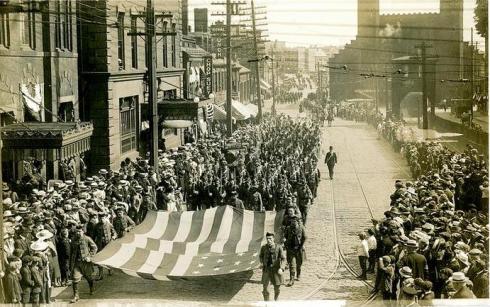Given that I, along with every other historically-conscious person in the world, have been thinking about World War One and its aftermath in this anniversary year of its commencement, that has to be my focus for this Veterans Day. I’ve been thinking about the impact of the Great War on Salem and its inhabitants for a while, but I haven’t really had time to engage in any serious research: I suppose that I have until 2017! This is one of those cases of “anniversary history” where the American and European perspectives are not quite in sync. I have found one great digital database, however: at the State Library of Massachusetts. A five-year project to digitize over 8,000 portraits of soldiers has created an amazing resource that every descendant of a Massachusetts doughboy will want to check out. Most of the photographs are accompanied by “cut slips” of paper that I find almost as poignant as the images themselves: data sheets for prospective Boston Globe stories which lists the soldier’s name, hometown, and story: either “experiences” or “killed in action”. The photographs were taken before the men shipped out; the slips were made out after armistice was declared. Some of these Salem men came back, and some did not.
Corp. Walter W. Annable, Battery F., 101st F. A.; Came Back.
Capt. Ernest R. Redmond, Battery E, 101st F. A; Came Back (and ran unsuccessfully for Mayor of Salem in 1925).
Corp. Henry J. Marcotte, Co. M, 103rd Infantry; Came Back.
Corp. Henry F. Lynch, 301st F. A.; Came Back.
Henry G. Murphy, 101st F. A. Battery D.; Killed in Action in France.
O. J. Bufford, Battery D., 101st F. A.; Killed by accident in France.
These are just a few Salem men and their fates: the entire record includes many casualties of war and as many–or more–of disease: the immediate post-war influenza epidemic which decimated the United States and the world. Imagine surviving the trenches and then dying from the flu in an army camp back home–or nearly there. Of course every death is heroic, but some were officially recognized as such, like that of Thomas Upton of Salem, who received a Distinguished Service Cross posthumously for extraordinary heroism in action near Belleau, France, on July 20, 1918. He voluntarily crossed a zone swept by machine gun and shell fire to aid wounded soldiers, and was killed. Conflict and contagion in 1918, and cheering crowds for those that came back.
Massachusetts troops arriving in Boston in 1918, Leslie Jones Collection, Boston Public Library; the first Armistice Day Parade in Salem, 1919, Dionne Collection, Salem State University Archives.















November 10th, 2014 at 7:38 am
Terrific that with today’s far reaching technology we can still remember them in person. They deserve to be preserved in time somewhere in our collective memories.
November 10th, 2014 at 7:45 am
Totally agree–and photographs always help with that process.
November 11th, 2014 at 8:15 am
Great tribute to WW1, my Grandfather fought in WW1. Born 1895 died 1976.
The last picture especially caught my eye. How many states did the USA have in 1918?
November 11th, 2014 at 8:17 am
“On February 14, 1912, Arizona became the 48th state in the union. The last two territories, Alaska and Hawaii would not become states until 1959.”
Answers.com
Funny, that flag looks like it has less than 48.
November 11th, 2014 at 8:42 am
Great point, Mark. I know it’s the Armistice Day parade, so that flag must have some special significance: perhaps it refers to the “Yankee Division” of New England soldiers. I’ll check it out.